Module 4 Planes, ships and trains Unit 1 He lives the farthest from school课件(共23张PPT)
文档属性
| 名称 | Module 4 Planes, ships and trains Unit 1 He lives the farthest from school课件(共23张PPT) | 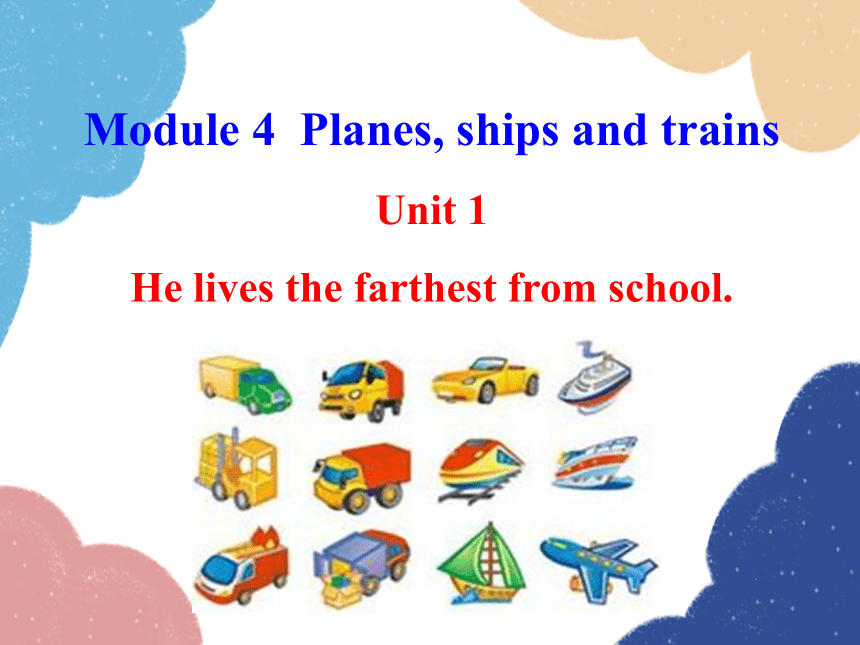 | |
| 格式 | ppt | ||
| 文件大小 | 2.7MB | ||
| 资源类型 | 教案 | ||
| 版本资源 | 外研版 | ||
| 科目 | 英语 | ||
| 更新时间 | 2022-11-30 11:04:39 | ||
图片预览


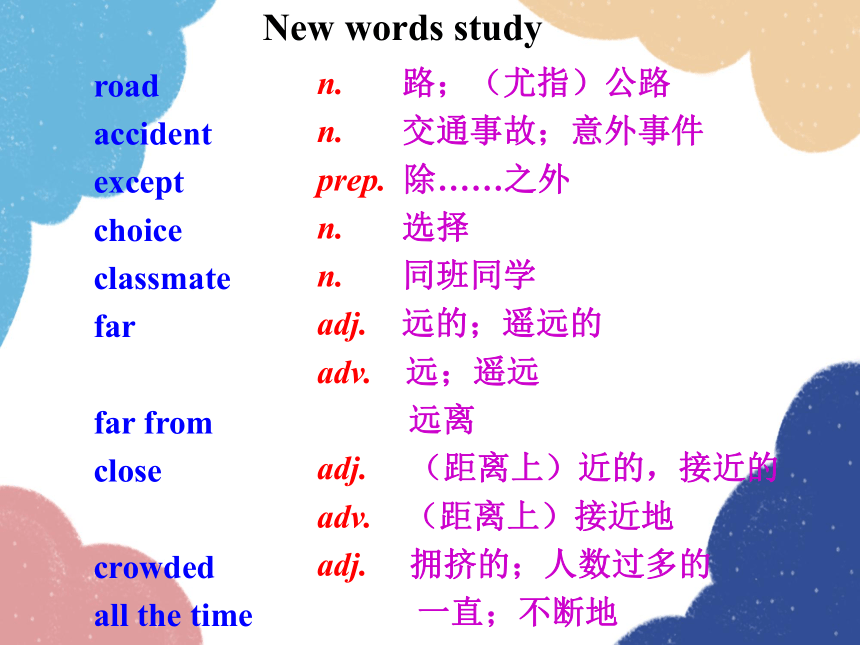
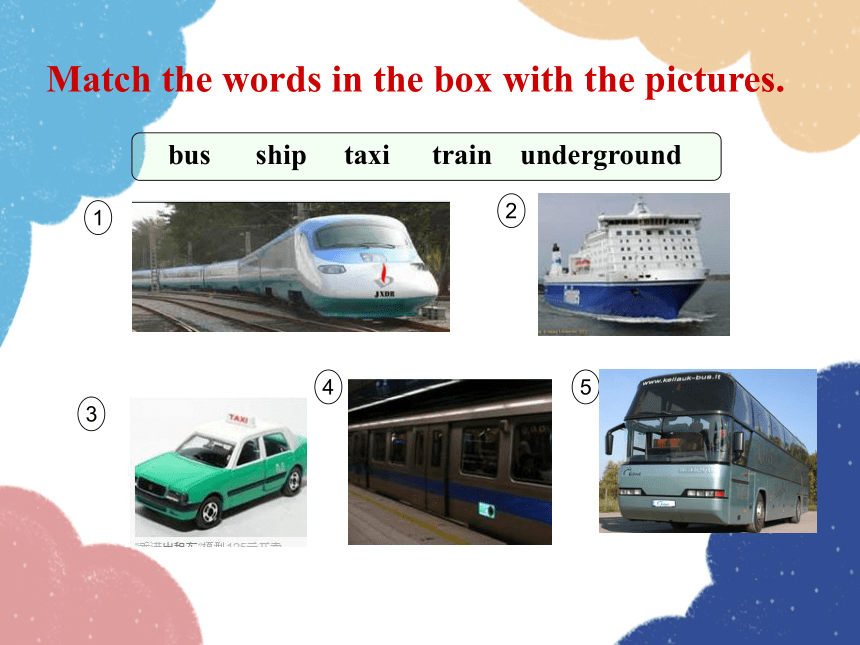


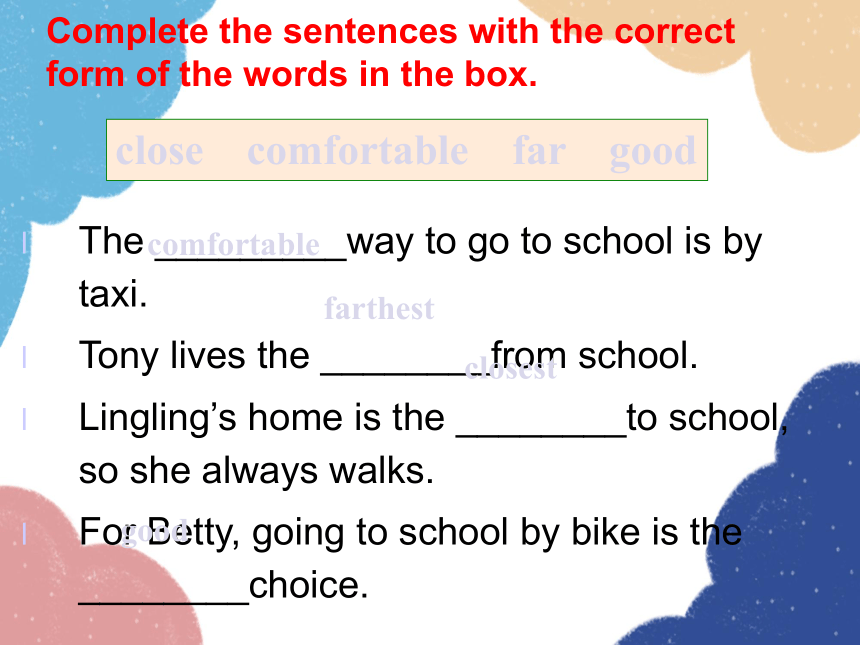

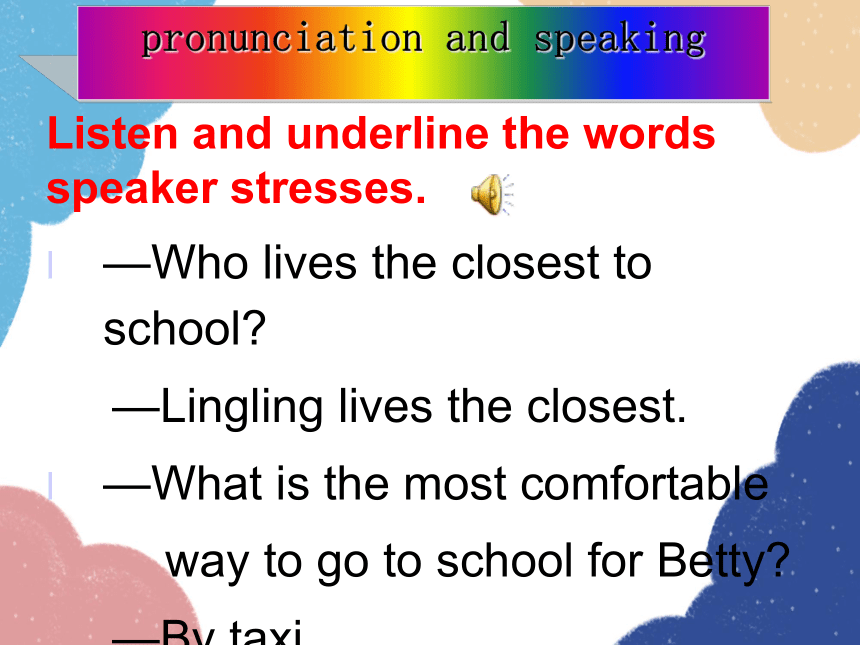
文档简介
(共23张PPT)
Module 4 Planes, ships and trains Unit 1 He lives the farthest from school.
Lead-in
A: How do you go to school
B: I go to school by ______ / on foot.
subway
walk
ferry
taxi
train
bike
bus
plane
road
accident
except
choice
classmate
far
far from
close
crowded
all the time
n. 路;(尤指)公路
n. 交通事故;意外事件
prep. 除……之外
n. 选择
n. 同班同学
adj. 远的;遥远的
adv. 远;遥远
远离
adj. (距离上)近的,接近的
adv. (距离上)接近地
adj. 拥挤的;人数过多的
一直;不断地
New words study
Match the words in the box with the pictures.
1
3
4
2
5
ship
taxi
bus
underground
train
Listen and match the words in the box with the picture in Activity 1. You need to use one word more than once.
busy cheap expensive modern
Listen and complete the table.
Betty Tony Lingling Daming
Ways to go to school
Takes the underground
Walks / On foot
By bus
By bus
Complete the sentences with the correct form of the words in the box.
The _________way to go to school is by taxi.
Tony lives the ________from school.
Lingling’s home is the ________to school, so she always walks.
For Betty, going to school by bike is the ________choice.
close comfortable far good
comfortable
farthest
closest
good
Complete the sentences with the words or expression in the box.
All the students take the bus to school ________Sam.
The ________train in the world is the Shanghai airport train.
I saw a (n )_________on my way to school yesterday.
I do not take the bus to school because it is usually very________.
accident crowded except most modern
Listen and underline the words speaker stresses.
—Who lives the closest to school
—Lingling lives the closest.
—What is the most comfortable
way to go to school for Betty
—By taxi.
pronunciation and speaking
Language Points
1. But nobody was late, except me.
但是没有人迟到,除了我。
(1)except “除……之外”,后面可接名词、代词、v.-ing形式、副词、介词短语和从句等。
E.g. We have an English lesson every day except Sunday.
除星期天外,我们每天有一堂英语课。(星期天不上)
(2)besides “除……外, 另外还有”, 着重“另外还有”。
E.g. Besides English, he has to study German.
除了英语, 他还要学德语。 (学英语)
(3)except for也表示“除……以外”,指对某种基本情况进行具体的细节方面的修正。
E.g. I can answer all the questions except for the last one.
除了最后一题外,所有题目我都可以解答。
2. Maybe I should go to school by taxi.
或许我应该乘出租车上学。
(1)maybe “或许;可能”, 副词,在句中作状语,相当于perhaps,常位于句首。
E.g. Maybe she’ll come this afternoon.
她可能今天下午来。
【辨析】
May be中,may是情态动词,be是动词原形,两者构成完整的谓语形式,与主语形成系表结构,意为“也许是、可能是”。
E.g. He may be a soldier. 他可能是名军人。
(2)by taxi “乘坐出租车”
by+交通工具 “乘……, 坐……”。
注意:表示交通工具的名词前不能有冠词。
表达交通方式
1.骑自行车 ride to … = go to…by bike/on a bike
2.乘公共汽车 go to… by bus/on a bus = take/catch a bus
3.坐汽车 drive to …= go to…by car/in a car
4.乘火车 go to …by train/on a train =take /catch a train
5.乘轮船 by ship /sea
6.乘飞机 fly to…=go to…by plane/air/on a plane
7.乘渡轮 by ferry
8. 乘地铁 take the underground = go to ... by subway
3. How does Tony go to school 托尼怎么去上学?
how是疑问副词,意为“如何、怎样”,用来询问交通方式
I walk. / I go by bus./…
How do you go to school
E.g. My home is far from school. 我家离学校很远。
4. far from 远离
The school is close to my home. 学校离我家很近。
close to 离……近
What happened 怎么了?出什么事了?
= What’s wrong / What’s the matter
Don’t worry. 别担心。
Everyday English
close→closest
cheap→cheapest
dangerous→ most dangerous
comfortable→ most comfortable
good/well→best
far→farthest
big→biggest
hot→hottest
heavy→heaviest
easy→easiest
你能自己总结出最高级的构成形式吗?
fast→fastest
safe→safest
Grammar
对三个或三个以上的人或事物进行比较时,用形容词和副词的最高级形式来表达。
构成方法:
1. 一般在词尾加-est。
2.以字母e结尾的形容词/副词,直接加-st。
3. 以重读闭音节结尾的形容词/副词,如末尾只有
一个辅音字母,应先双写该字母,再加-est。
4.以辅音字母+y结尾的形容词/副词,变y为i再加
-est。
5.部分双音节词或多音节词,在词前加most。
注意:形容词的最高级前一般要加定冠词the, 而副词的最高级前则可加也可不加the。
Practice
I. 用所给词的适当形式填空
1. Tony lives ___________ ( far) from school in his class.
2. Going by bus is the ____ ( good) way to get to school.
3. I think going by bike is _________________
(dangerous) way of all.
4. Daming has the ______ (fast) journey by bicycle.
the most dangerous
fastest
the farthest
best
Ⅱ 完成句子
1.他住得离邮局最远。
He lives ___ _______ ______ the post office.
2. 这是到校的最好方式。
It’s ____ ____ ____ to get to school.
3.我住得离学校最近。
I live ___ ________ ___ school.
farthest from
the best way
closest to
练练吧
the
the
句型转换
He sometimes takes the train to go to Beijing .
(改为同义句)
He sometimes goes to Beijing ____ _____.
2. He often walks to school.(改为同义句)
He often goes to school ____ ____.
3. Dad always goes to work by car.(对画线部分提问)
____ _____ dad always go to work
does
by train
on foot
How
Module 4 Planes, ships and trains Unit 1 He lives the farthest from school.
Lead-in
A: How do you go to school
B: I go to school by ______ / on foot.
subway
walk
ferry
taxi
train
bike
bus
plane
road
accident
except
choice
classmate
far
far from
close
crowded
all the time
n. 路;(尤指)公路
n. 交通事故;意外事件
prep. 除……之外
n. 选择
n. 同班同学
adj. 远的;遥远的
adv. 远;遥远
远离
adj. (距离上)近的,接近的
adv. (距离上)接近地
adj. 拥挤的;人数过多的
一直;不断地
New words study
Match the words in the box with the pictures.
1
3
4
2
5
ship
taxi
bus
underground
train
Listen and match the words in the box with the picture in Activity 1. You need to use one word more than once.
busy cheap expensive modern
Listen and complete the table.
Betty Tony Lingling Daming
Ways to go to school
Takes the underground
Walks / On foot
By bus
By bus
Complete the sentences with the correct form of the words in the box.
The _________way to go to school is by taxi.
Tony lives the ________from school.
Lingling’s home is the ________to school, so she always walks.
For Betty, going to school by bike is the ________choice.
close comfortable far good
comfortable
farthest
closest
good
Complete the sentences with the words or expression in the box.
All the students take the bus to school ________Sam.
The ________train in the world is the Shanghai airport train.
I saw a (n )_________on my way to school yesterday.
I do not take the bus to school because it is usually very________.
accident crowded except most modern
Listen and underline the words speaker stresses.
—Who lives the closest to school
—Lingling lives the closest.
—What is the most comfortable
way to go to school for Betty
—By taxi.
pronunciation and speaking
Language Points
1. But nobody was late, except me.
但是没有人迟到,除了我。
(1)except “除……之外”,后面可接名词、代词、v.-ing形式、副词、介词短语和从句等。
E.g. We have an English lesson every day except Sunday.
除星期天外,我们每天有一堂英语课。(星期天不上)
(2)besides “除……外, 另外还有”, 着重“另外还有”。
E.g. Besides English, he has to study German.
除了英语, 他还要学德语。 (学英语)
(3)except for也表示“除……以外”,指对某种基本情况进行具体的细节方面的修正。
E.g. I can answer all the questions except for the last one.
除了最后一题外,所有题目我都可以解答。
2. Maybe I should go to school by taxi.
或许我应该乘出租车上学。
(1)maybe “或许;可能”, 副词,在句中作状语,相当于perhaps,常位于句首。
E.g. Maybe she’ll come this afternoon.
她可能今天下午来。
【辨析】
May be中,may是情态动词,be是动词原形,两者构成完整的谓语形式,与主语形成系表结构,意为“也许是、可能是”。
E.g. He may be a soldier. 他可能是名军人。
(2)by taxi “乘坐出租车”
by+交通工具 “乘……, 坐……”。
注意:表示交通工具的名词前不能有冠词。
表达交通方式
1.骑自行车 ride to … = go to…by bike/on a bike
2.乘公共汽车 go to… by bus/on a bus = take/catch a bus
3.坐汽车 drive to …= go to…by car/in a car
4.乘火车 go to …by train/on a train =take /catch a train
5.乘轮船 by ship /sea
6.乘飞机 fly to…=go to…by plane/air/on a plane
7.乘渡轮 by ferry
8. 乘地铁 take the underground = go to ... by subway
3. How does Tony go to school 托尼怎么去上学?
how是疑问副词,意为“如何、怎样”,用来询问交通方式
I walk. / I go by bus./…
How do you go to school
E.g. My home is far from school. 我家离学校很远。
4. far from 远离
The school is close to my home. 学校离我家很近。
close to 离……近
What happened 怎么了?出什么事了?
= What’s wrong / What’s the matter
Don’t worry. 别担心。
Everyday English
close→closest
cheap→cheapest
dangerous→ most dangerous
comfortable→ most comfortable
good/well→best
far→farthest
big→biggest
hot→hottest
heavy→heaviest
easy→easiest
你能自己总结出最高级的构成形式吗?
fast→fastest
safe→safest
Grammar
对三个或三个以上的人或事物进行比较时,用形容词和副词的最高级形式来表达。
构成方法:
1. 一般在词尾加-est。
2.以字母e结尾的形容词/副词,直接加-st。
3. 以重读闭音节结尾的形容词/副词,如末尾只有
一个辅音字母,应先双写该字母,再加-est。
4.以辅音字母+y结尾的形容词/副词,变y为i再加
-est。
5.部分双音节词或多音节词,在词前加most。
注意:形容词的最高级前一般要加定冠词the, 而副词的最高级前则可加也可不加the。
Practice
I. 用所给词的适当形式填空
1. Tony lives ___________ ( far) from school in his class.
2. Going by bus is the ____ ( good) way to get to school.
3. I think going by bike is _________________
(dangerous) way of all.
4. Daming has the ______ (fast) journey by bicycle.
the most dangerous
fastest
the farthest
best
Ⅱ 完成句子
1.他住得离邮局最远。
He lives ___ _______ ______ the post office.
2. 这是到校的最好方式。
It’s ____ ____ ____ to get to school.
3.我住得离学校最近。
I live ___ ________ ___ school.
farthest from
the best way
closest to
练练吧
the
the
句型转换
He sometimes takes the train to go to Beijing .
(改为同义句)
He sometimes goes to Beijing ____ _____.
2. He often walks to school.(改为同义句)
He often goes to school ____ ____.
3. Dad always goes to work by car.(对画线部分提问)
____ _____ dad always go to work
does
by train
on foot
How
同课章节目录
- Module 1 How to learn English
- Unit 1 Let's try to speak English as much as possi
- Unit 2 You should smile at her.
- Unit 3 Language in use .
- Module 2 My home town and my country
- Unit 1 It's taller than many other buildings.
- Unit 2 Cambridge is a beautiful city in the east o
- Unit 3 Language in use .
- Module 3 Sports.
- Unit 1 Nothing is more exciting than playing tenni
- Unit 2 This year we training more carefully.
- Unit 3 Language in use .
- Module 4 Planes, ships and trains .
- Unit 1 He lives the farthest from school.
- Unit 2 What is the best way to travel.
- Unit 3 Language in use .
- Module 5 Lao She Teahouse.
- Unit 1 I wanted to see the Beijing Opera.
- Unit 2 It descibes the changes in Chinese society.
- Unit 3 Language in use .
- Module 6 Animals in danger.
- Unit 1 It allows people to get closer to them .
- Unit 2 The WWF is working hard to save them all.
- Unit 3 Language in use .
- Revision module A
- Module 7 A famous story
- Unit 1 Alice was sitting with her sister by the ri
- Unit 2 She was thinking about her cat.
- Unit 3 Language in use .
- Module 8 Accidents
- Unit 1 While the car were changing to red, a car s
- Unit 2 I was trying to pick it up when it bite me
- Unit 3 Language in use .
- Module 9 Population
- Unit 1 The population of China is about 1.37 billi
- Unit 2 Arnwick was a city with 200,000 people.
- Unit 3 Language in use .
- Module 10 The weathe
- Unit 1 It might snow.
- Unit 2 The weather is fine all year round.
- Unit 3 Language in use .
- Module 11 Way of life
- Unit 1 In China ,we open a gift later.
- Unit 2 In England, you usually drink tea with milk
- Unit 3 Language in use .
- Module 12 Help
- Unit 1 What should we do before help arrives?
- Unit 2 Stay away from windows and heavy furniture.
- Unit 3 Language in use .
- Revision module B
